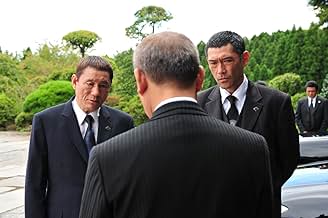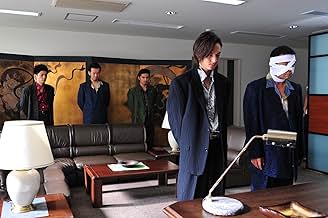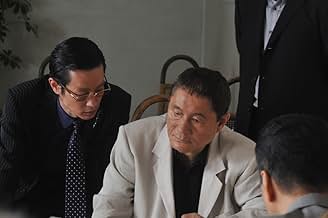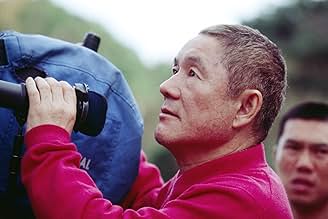Il capo di un importante sindacato criminale ordina al suo luogotenente di abbattere una banda di trafficanti di droga, un lavoro che passa al suo subordinato sofferente.Il capo di un importante sindacato criminale ordina al suo luogotenente di abbattere una banda di trafficanti di droga, un lavoro che passa al suo subordinato sofferente.Il capo di un importante sindacato criminale ordina al suo luogotenente di abbattere una banda di trafficanti di droga, un lavoro che passa al suo subordinato sofferente.
- Regia
- Sceneggiatura
- Star
- Premi
- 1 candidatura
- Ôtomo
- (as Beat Takeshi)
Trama
Lo sapevi?
- QuizFollowing a string of unconventional, commercially unappealing films, Takeshi Kitano engineered this film specifically as commercially appealing, going back to the genre which brought him the most success, and going as far as imagining the death scenes first and writing a story around them later.
- Citazioni
Ikemoto: H-h-hold on a minute...
[panting]
Ikemoto: I'll reverse the banishment.
Ôtomo: Huh?
Ikemoto: I'll reverse the banishment.
Ôtomo: You banish me, then you reverse it?
[explodes]
Ôtomo: How many fucking tongues do you have?
Ikemoto: Huh?
Ôtomo: Are you deaf? How many do you have?
Ikemoto: I've only got one.
Ôtomo: Only one? *Two* or *three* is more like it, you fucking prick!
Ikemoto: I'm telling you I've only got one tongue!
Ôtomo: [a little calmer] Open your mouth.
[louder]
Ôtomo: Stick out your tongue!
Ikemoto: [beat] Huh?
Ôtomo: [barking] Stick out your tongue!
[Ikemoto reveals reluctantly a bit of his tongue]
Ôtomo: MORE!
[Ikemoto does]
Ôtomo: STICK IT OUT, YOU MOTHERFUCKER!
[Ikemoto sticks out his entire tongue, then Otomo slams his jaw so violently that Ikemoto bites through his own tongue; Otomo then shoots him]
- ConnessioniFeatured in Ebert Presents: At the Movies: Episodio #2.18 (2011)
Typically, the topic of yakuza is often shunned. If ever confronted, it is often used to accentuate comedic elements, whilst leaving the truth of the yakuza world unchallenged. However, director/screenwriter/actor Takeshi Kitano goes against the flow and makes a comeback with this feature film after almost a decade long hiatus. Though this is not as well received as compared to other made in Japan films, it has still received much acclamation. Earlier in his directing career, he was already known for "Violent Cop" and "Sonatine", which also dealt with the dark world of yakuza. It is therefore admirable for his efforts to bring forth the most truthful reflection of the dark side of Japan despite the risk of low commercial success. And for this film, he has once again managed to project a somewhat accurate image of the realities in the yakuza scene.
The overarching plot of the film works with the conflicts that could possibly exist in any relationships – malice and greed. It circles the power struggle between the Iketomo-gumi and its affliation Murase-gumi and his sworn brother Otomo (Takeshi Kitano) who has his own crew as well. While Otomo tries to break free from the subordination of the Murase-gumi, they too try to acquire greater power. In this power struggle, they begin to plot against one another and result in sheer violence and torture. In this aspect, Takeshi is quite creative and playful as he invents numerous ways that the characters get tortured or die. As revealed in one of his interviews, he actually came up with these before he wrote the narrative that parallels with the violence. The convincing gore and never-imagined ways to kill and torture; for this you really have to watch it for yourself.
Takeshi has carefully chosen who to cast for this film. He made a point not to repeat any actors who worked with him in his previous yakuza related works. The cast is pretty commendable for they capture the essence of the characters they are portraying, and even are said to get through each scene with only one or two shots. One of the more outstanding actors is undeniably Ryo Kase, who sports fluent English as opposed to the Japrish/Engrish we often associate Japanese with. That being said, the English dialogues between him and the gaijin (foreigner) were rather blunt and funny. This is probably intentionally designed to poke fun and entertain the viewers.
In the technical aspect, Takeshi displays much competence in his camera- work. From wide-angled shots, to close-ups, to long pans and even point- of-view shots; he utilized a variety of these shots to effectively communicate the non-verbal messages. Put simply, you will find it easier to 'get into the mood' as he engages the viewers very much. Also, hallmark of his films is the seemingly abrupt cuts that often do not signal direct causality in the sequences. As the idiom goes, "one man's meat is another man's poison". You will either hate this style or love this style. Though it can get confusing at times, the overarching plot sets a frame for which the sequences happen. Therefore in its fairly organized manner, it sparks brilliance in its narrative.
Overall the film though unconventional, is a careful examination of the selfish desires that deteriorates relationships. Fitted into the yakuza context, this message has an added punch. On a random note, do look forward to the unanticipated twist towards the end!
- www.moviexclusive.com
- moviexclusive
- 15 set 2010
- Permalink
I più visti
- How long is Outrage?Powered by Alexa
Dettagli
- Data di uscita
- Paese di origine
- Siti ufficiali
- Lingue
- Celebre anche come
- The Outrage
- Luoghi delle riprese
- Chuo-ku, Tokyo, Giappone(Exterior)
- Aziende produttrici
- Vedi altri crediti dell’azienda su IMDbPro
Botteghino
- Lordo Stati Uniti e Canada
- 44.745 USD
- Fine settimana di apertura Stati Uniti e Canada
- 6.518 USD
- 4 dic 2011
- Lordo in tutto il mondo
- 8.457.741 USD
- Tempo di esecuzione1 ora 49 minuti
- Colore
- Mix di suoni
- Proporzioni
- 2.35 : 1
Contribuisci a questa pagina


























